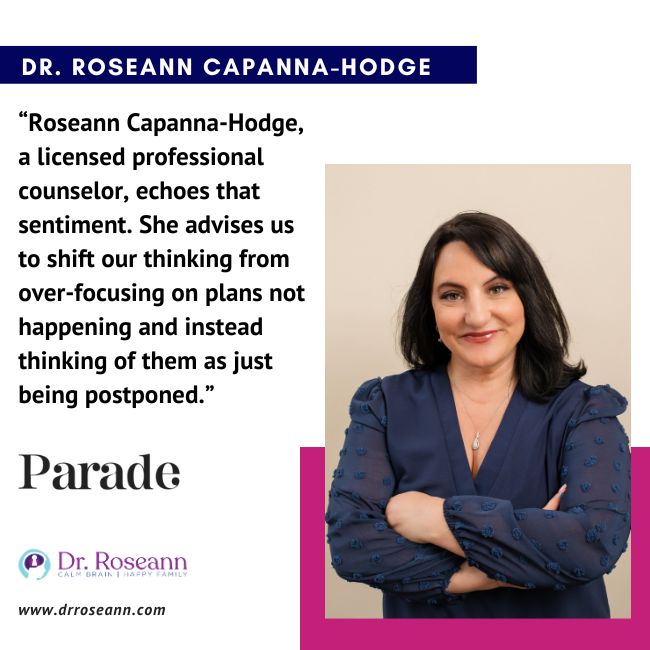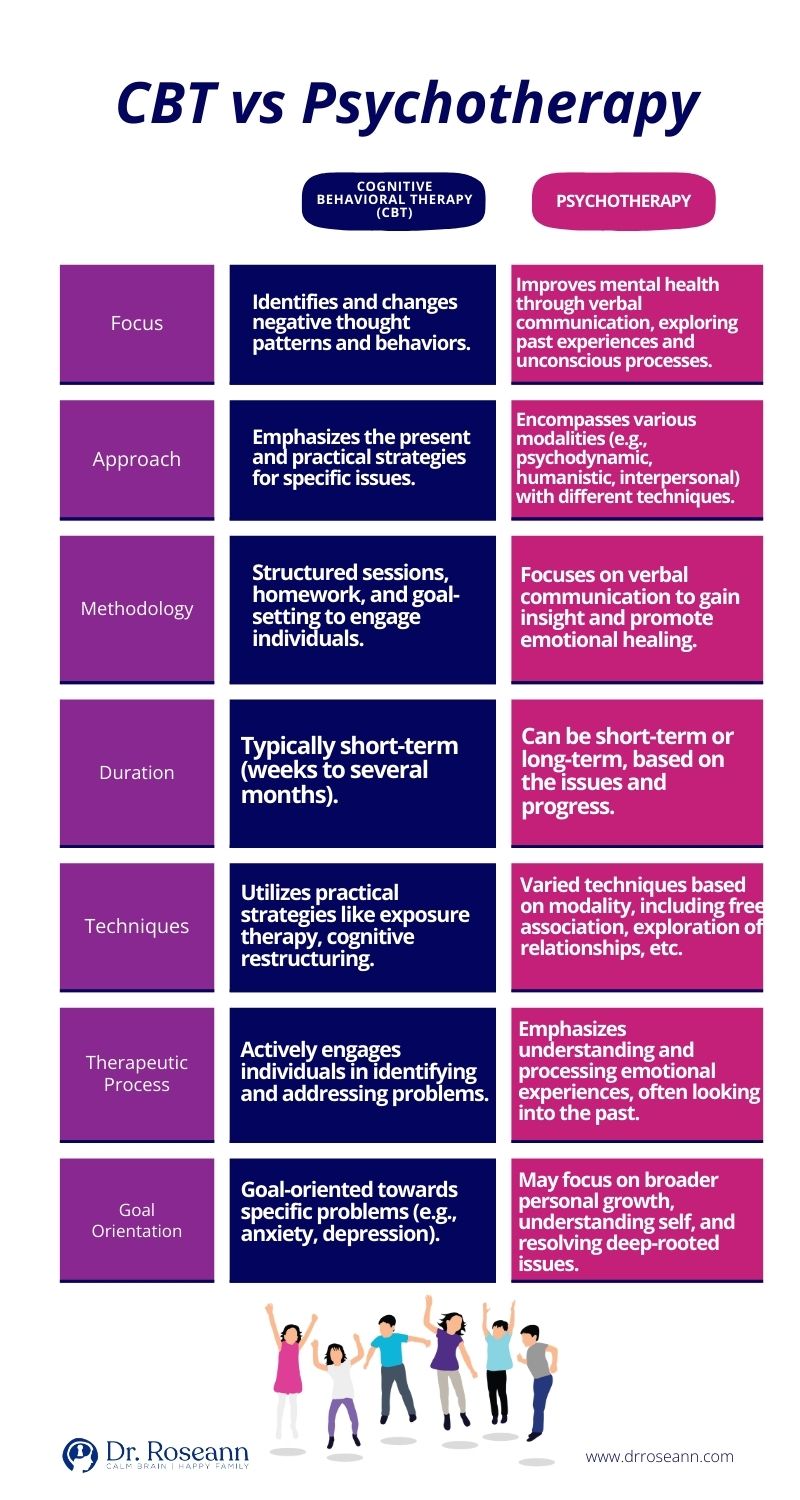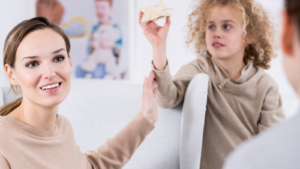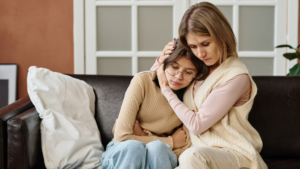I am a featured expert in an article released by Parade Magazine titled, “Use These CBT and DBT-Based Strategies for Coping With Anxiety When You Don't Know What the Future Holds”. I weighed in on accepting emotions and how to shift your thinking. Here’s a quote from that article.
Learning more about psychotherapy vs CBT to stop anxiety and anxious thinking will give us a better understanding of how we can support our children if they struggle with anxiety or panic attacks. Let’s start with the difference between cognitive and behavioral therapy definitions.
What is Psychotherapy?
Psychotherapy is a general term that refers to the treatment of mental health disorders through verbal communication between a therapist and a client. It encompasses a range of therapeutic approaches aimed at improving an individual's emotional well-being, behavior, and overall quality of life.
Psychotherapy can be conducted in various formats including individual, group, couples, or family therapy, and it can be short-term or long-term depending on the goals and needs of the client. Studies show that clients get significant benefits from psychotherapy, with long-term treatment showing superior outcomes compared to short-term interventions (Seligman, 1995).
What is CBT?
CBT stands for Cognitive Behavioral Therapy, which is a specific type of psychotherapy that focuses on identifying and changing negative thought patterns and behaviors that contribute to emotional distress and mental health problems. There are CBT types that are mainly focused on very specific conditions.
CBT psychology is based on the premise that our thoughts, feelings, and behaviors are interconnected, and by addressing and altering dysfunctional patterns, individuals can effectively manage their symptoms and improve their mental health.
A goal of cognitive therapists is to help their clients work through anxiety, among many other conditions. Many studies show the short-term and long-term efficacy of CBT for anxiety (DiMauro et al., 2013).
Cognitive Behavioral Therapy vs Psychotherapy
When you compare psychotherapy vs cognitive behavioral therapy, you’ll clearly see how they differ in their approaches and techniques. Here’s a summary of their differences:
Cognitive Behavioral Therapy:
- Focuses on identifying and changing negative thought patterns and behaviors that contribute to emotional distress and mental health problems.
- Emphasizes the present moment and practical strategies for addressing specific issues, such as anxiety, depression, or phobias.
- Utilizes structured sessions, homework assignments, and goal-setting to actively engage individuals in the therapeutic process.
- Typically short-term, with sessions ranging from a few weeks to several months, depending on the individual's needs and goals.
Psychotherapy:
- Encompasses a broader range of therapeutic approaches aimed at improving mental health through verbal communication between a therapist and a client.
- Can include various modalities such as psychodynamic therapy, humanistic therapy, and interpersonal therapy, each with its own theoretical principles and techniques.
- Focuses on exploring past experiences, relationships, and unconscious processes to gain insight into current difficulties and promote emotional healing.
- Can be short-term or long-term, depending on the depth of issues being addressed and the client's progress in therapy.
Examples of CBT Phrases
The role of the therapist in cognitive therapy is to guide and facilitate the therapeutic process. Here are ways CBT can help in various situations.
Identifying and Challenging Thoughts
CBT phrases address anxiety by helping children recognize and challenge patterns of anxious thinking. Through questioning evidence, examining alternatives, and generating counterarguments, CBT empowers kids and teens to reframe their anxious beliefs into more balanced perspectives. It helps reduce the intensity of their anxiety and cultivate resilience in managing their emotions.
Examples of CBT phrases:
“I'm going to examine the evidence for and against this thought.”
“What's another way I could look at this situation?”
“How realistic is this thought? Maybe it's not as bad as I'm thinking.”
Setting Realistic Goals
CBT phrases address anxiety by assisting children and teens in setting realistic goals that promote a sense of control and accomplishment. By breaking down larger objectives into smaller, achievable steps, CBT helps individuals mitigate feelings of overwhelm and uncertainty to reduce anxiety.
Setting realistic goals through CBT empowers them to focus their efforts on tangible and attainable outcomes while fostering a sense of progress and confidence in managing anxious thoughts and behaviors.
Examples of CBT goals:
“I'll break down my goal into smaller steps that I can achieve.”
“What's one thing I can do today to get closer to my goal?”
“I need to set goals that push me but are still possible to reach.”
Behavioral Activation
CBT phrases address anxiety through behavioral activation by encouraging children and teens to engage in activities that promote positive emotions and distract from anxious thoughts. Doing this can break the cycle of rumination and avoidance commonly associated with anxiety.
The CBT phrases below can help promote behavioral activation as a proactive strategy to increase daily functioning, enhance mood, and reduce the frequency and intensity of anxious thinking patterns.
CBT Phrases
“What activities do I enjoy or find fulfilling?”
“I should schedule some time for activities that make me feel good.”
“Engaging in things I love can really lift my mood.”
Problem-Solving Skills
CBT phrases address anxiety through problem-solving skills by guiding kids to break down anxiety-provoking situations into manageable parts. Brainstorming potential solutions, evaluating their effectiveness, and implementing actionable steps help them gain a sense of control over their anxiety triggers.
This list of CBT phrases empowers individuals to develop adaptive problem-solving strategies, foster resilience, and reduce the impact of anxious thinking on daily functioning. These can help kids get things done.
CBT Phrases
“I'm going to brainstorm different ways to solve this problem.”
“What are the good and bad sides of each solution?”
“Breaking this problem into smaller parts might make it easier to handle.”
Learning Coping Strategies
CBT phrases address anxiety by facilitating the learning of coping strategies that individuals can employ when faced with anxious thoughts or situations. Through techniques such as deep breathing, positive self-talk, and relaxation exercises, children and teens can effectively manage their anxiety symptoms.
By practicing coping strategies regularly and using the phrases below, kids can build resilience and confidence in their ability to cope with anxious thoughts, ultimately reducing their overall levels of anxiety and distress.
CBT Phrases
“I'll try deep breathing or relaxation exercises when I'm feeling anxious.”
“I need to challenge my negative thoughts and replace them with more positive ones.”
“Remembering what has helped me cope in the past could be useful now.”
Identifying and Challenging Core Beliefs
CBT phrases address anxiety by helping individuals identify and challenge core beliefs that contribute to anxious thinking patterns. By questioning the validity and accuracy of these beliefs, individuals can gain insight into their irrational or exaggerated nature, reducing their impact on anxiety.
Through cognitive restructuring techniques and reframing exercises, CBT phrases empower individuals to replace negative core beliefs with more adaptive and realistic perspectives, thereby alleviating anxiety and promoting emotional well-being.
CBT Phrases
“What do I believe about myself, others, and the world?”
“How are these beliefs affecting how I see things?”
“Maybe some of my beliefs aren't true or helpful.”
Monitoring and Journaling
CBT phrases address anxiety by encouraging individuals to monitor and journal their thoughts, emotions, and behaviors. By tracking their experiences, individuals can identify patterns, triggers, and automatic thoughts associated with anxiety.
Through journaling, individuals gain insight into their cognitive and emotional responses, allowing them to challenge and reframe anxious thinking patterns with the help of CBT techniques. This process promotes self-awareness, enhances coping strategies, and ultimately reduces the frequency and intensity of anxious thoughts and feelings.
CBT Phrases
“I'll start keeping a journal to track my thoughts and feelings.”
“Looking back at what I've written might show me patterns.”
“I can see how I've dealt with similar situations before and what worked.”
Building Self-Compassion
CBT phrases address anxiety by promoting the development of self-compassion, which involves treating oneself with kindness and understanding, particularly during times of anxiety. By using phrases that encourage self-kindness and acceptance, individuals can cultivate a more compassionate and supportive inner dialogue.
Through practicing self-compassion, individuals learn to validate their experiences, reduce self-criticism, and build resilience in the face of anxiety, ultimately fostering greater emotional well-being and reducing the impact of anxious thinking patterns.
CBT Phrases
“I'll try to be as kind to myself as I would to a friend.”
“Everyone makes mistakes. What can I learn from this?”
“Taking care of myself and being gentle with myself is important.”
Your Anxiety Plan of Action
Understanding and supporting a child with anxiety requires patience and insight, recognizing the unique advantages and challenges their condition presents. That is exactly why I made The Natural Anxiety Relief Kit. Developed from extensive professional experience with a multitude of families, this kit serves as a guiding light for parents.
It's designed to deliver reliable information and a definitive approach to enhance the inherent strengths of anxious children while addressing their specific needs. Begin the journey towards empowering your child by utilizing The Natural Anxiety Relief Kit now.
Is CBT a Psychotherapy Treatment?
Yes, Cognitive Behavioral Therapy is a form of psychotherapy. CBT psychotherapy covers a behavioral approach that is aimed at improving mental health and well-being through verbal communication between a therapist and a client. CBT specifically focuses on identifying and changing negative thought patterns and behaviors that contribute to emotional distress and mental health problems.
What is a cognitive therapist?
A cognitive therapist is a mental health professional who specializes in providing CBT counseling to individuals experiencing psychological distress or mental health issues. Cognitive therapists are trained to help clients identify and challenge negative thought patterns and beliefs that contribute to their difficulties.
What is psychotherapy treatment?
Psychotherapy treatment, often simply referred to as therapy, is a form of mental health treatment that involves talking to a trained therapist or counselor to address psychological issues, emotional difficulties, and behavioral challenges.
What is psychotherapy vs therapy?
Psychotherapy is a specific form of therapy focused on addressing mental health issues through verbal communication between a trained therapist and a client. In contrast, therapy is a broader term that encompasses various forms of treatment aimed at improving overall well-being, including other forms of psychotherapy.
What is CBT in psychology?
CBT is one of the many types of therapy in psychology that focuses on addressing dysfunctional thoughts, emotions, and behaviors to alleviate psychological distress and improve mental health.
Is psychotherapy the same as therapy?
Yes, in many contexts, psychotherapy and therapy are used interchangeably to refer to the same thing: a form of treatment that involves talking to a trained professional to address mental health issues, emotional challenges, or behavioral difficulties.
Is CBT talk therapy?
Yes, CBT is a form of talk therapy. It involves verbal communication between a trained therapist and a client to address psychological issues, emotional difficulties, and behavioral challenges. This makes CBT and psychotherapy highly related.
Who does cognitive therapy?
Cognitive therapy is typically provided by mental health professionals trained in this approach, including psychologists, psychiatrists, licensed therapists, clinical social workers, and similar CBT practitioners. A psychologist who practices cognitive therapy counselling is a mental health professional with specialized training and expertise in providing therapy to individuals seeking treatment for psychological issues, emotional difficulties, or behavioral challenges.
What's cognitive therapy for kids?
CBT for children is a form of cognitive psychotherapy and behavioral therapy that is tailored to address the unique needs and developmental stages of children and adolescents. It focuses on helping young individuals identify and challenge negative thought patterns and behaviors, develop coping skills, and promote positive emotional regulation.
Is talk therapy the same as psychotherapy?
Yes, talk therapy and psychotherapy are often used interchangeably to refer to the same thing. They are a form of treatment that involves talking to a trained therapist or counselor to address mental health issues, emotional difficulties, or behavioral challenges.
What is cognitive behavioral psychology?
Cognitive Behavioral Psychology is a branch of psychology that focuses on the connections between thoughts, emotions, and behaviors, and how these elements interact to influence mental health and well-being.
Citations
DiMauro, J., Domingues, J., Fernandez, G., & Tolin, D. F. (2013). Long-term effectiveness of CBT for anxiety disorders in an adult outpatient clinic sample: A follow-up study. Behavior Research and Therapy, 51(2), 82–86. https://doi.org/10.1016/j.brat.2012.10.003
Seligman, M. E. P. (1995). The effectiveness of psychotherapy: The Consumer Reports study. Psycnet.apa.org. https://psycnet.apa.org/record/1996-13324-001
Dr. Roseann is a mental health expert in Anxiety who frequently is in the media:
- Parade The 10 Best Heated, Weighted Blankets for a Cozy, Anxiety-Free Night.
- CityCURRENT Solutions for Your Kid’s Focus, Anxiety and Behavioral Issues with Dr. Roseann Capanna-Hodge.
- Barriers To Bridges Breaking the Cycle of Anxiety and Harnessing the Healing Power of Meditation.
- Yahoo!Life Anxious and On-Edge? MDs Share the Best Supplements to Tame Stress Naturally
Always remember… “Calm Brain, Happy Family™”
Are you looking for SOLUTIONS for your struggling child or teen?
Dr. Roseann and her team are all about solutions, so you are in the right place!
Grab your complimentary copy of
147 Therapist-Endorsed Self-Regulation Strategies for Children: A Practical Guide for Parents
There are 3 ways to work with Dr. Roseann:
You can get her books for parents and professionals, including: It’s Gonna Be OK™: Proven Ways to Improve Your Child’s Mental Health, Teletherapy Toolkit™ and Brain Under Attack: A Resource For Parents and Caregivers of Children With PANS, PANDAS, and Autoimmune Encephalopathy.
If you are a business or organization that needs proactive guidance to support employee mental health or an organization looking for a brand representative, check out Dr. Roseann’s media page and professional speaking page to see how we can work together.
Dr. Roseann is a Children’s Mental Health Expert and Licensed Therapist who has been featured in/on hundreds of media outlets including The Mel Robbins Show, CBS, NBC, PIX11 NYC, Today, FORBES, CNN, The New York Times, The Washington Post, Business Insider, Women’s Day, Healthline, CNET, Parade Magazine and PARENTS. FORBES called her, “A thought leader in children’s mental health.”

She coined the terms, “Re-entry panic syndrome” and “eco-anxiety” and is a frequent contributor to media on mental health.
Dr. Roseann Capanna-Hodge has three decades of experience in working with children, teens and their families with attention-deficit hyperactivity disorder (ADHD), autism, concussion, dyslexia and learning disability, anxiety, Obsessive Compulsive Disorder (OCD), depression and mood disorder, Lyme Disease, and PANS/PANDAS using science-backed natural mental health solutions such as supplements, magnesium, nutrition, QEEG Brain maps, neurofeedback, PEMF, psychotherapy and other non-medication approaches.
She is the author of three bestselling books, It’s Gonna Be OK!: Proven Ways to Improve Your Child's Mental Health, The Teletherapy Toolkit, and Brain Under Attack. Dr. Roseann is known for offering a message of hope through science-endorsed methods that promote a calm brain.
Her trademarked BrainBehaviorResetⓇ Program and It’s Gonna be OK!Ⓡ Podcast has been a cornerstone for thousands of parents facing mental health, behavioral or neurodevelopmental challenges.
She is the founder and director of The Global Institute of Children’s Mental Health, Neurotastic™Brain Formulas and Dr. Roseann Capanna-Hodge, LLC. Dr. Roseann is a Board Certified Neurofeedback (BCN) Practitioner, a Board Member of the Northeast Region Biofeedback Society (NRBS), Certified Integrative Mental Health Professional (CIMHP) and an Amen Clinic Certified Brain Health Coach. She is also a member of The International Lyme Disease and Associated Disease Society (ILADS), The American Psychological Association (APA), Anxiety and Depression Association of America (ADAA) National Association of School Psychologists (NASP), International OCD Foundation (IOCDF).
© Roseann-Capanna-Hodge, LLC 2024
Disclaimer: This article is not intended to give health advice and it is recommended to consult with a physician before beginning any new wellness regime. *The effectiveness of diagnosis and treatment vary by patient and condition. Dr. Roseann Capanna-Hodge, LLC does not guarantee certain results.















